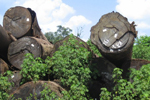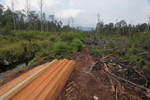Logging truck in Borneo. Photo by Rhett A. Butler |
Demand for timber and paper is contributing to destruction of the world’s most biodiverse rainforests and worsening climate change, argues a new report issued Tuesday by the Union of Concerned Scientists (UCS).
The report, “Wood for Good: Solutions for Deforestation-Free Wood Products,” says that certified wood products, timber and fiber from plantations on non-forested lands, and government policies to encourage less-damaging practices are three paths toward reducing deforestation and forest degradation for paper, packaging, furniture, and construction materials.
“The demand for tropical wood is growing globally, while more and more of the world’s tropical forests are disappearing,” said Pipa Elias, UCS consultant and the report’s author, noting that international trade in forest products is expected to reach $450 billion per year by the end of the decade, up from $257 billion in 2005. “It is 100 percent possible to harvest timber in the tropics profitably and sustainably. The main roadblock is a lack of political will. Businesses and consumers must demand responsibly manufactured products – giving governments and wood producers an incentive to expand sustainability efforts.”
 Logged-over forest being converted for oil palm plantations in Borneo. Photo by Rhett A. Butler |
While logging in the tropics typically doesn’t involve clear-cutting, a series of studies have shown that it often leads of outright deforestation. Logging roads provide access to farmers, ranchers, and others who seek to exploit the forest. At the same time, persistent degradation of forest stocks caused by harvesting of the most valuable trees, can eventually create strong financial incentives for converting natural forests to timber plantations. Nowhere is this more evident that Southeast Asia where millions of hectares of logged-over forest have been converted for pulp and paper plantations.
Although it highlights forest certification as a means for reducing deforestation, the report cautions that current standards don’t necessarily prevent ecological degradation of forests, a concern for environmentalists. Some standards are also stricter than others.
“While these programs do not prohibit logging from old growth forests, they are the best option currently available for maintaining the profitability of the wood industry while protecting forests,” UCS says in a statement.
UCS says consumers can do their part by making smarter purchasing decisions.
“Consumers certainly have an important role to play in safeguarding tropical forests,” said Pipa Elias. “Small, everyday choices like recycling and reducing the demand for new wood absolutely help to protect tropical forests.”
“Wood for Good” is third report UCS has issued in recent months on goods linked to tropical deforestation. The first, “Recipes for Success,” looked at feedstocks for vegetable oils like palm oil and soy. The second, “Grade A Choice?” looked at beef.
Related articles
Experts: sustainable logging in old-growth rainforests impossible

(07/19/2012) Industrial logging in primary tropical forests that is both sustainable and profitable is impossible, argues a new study in Bioscience, which finds that the ecology of tropical hardwoods makes logging with truly sustainable practices not only impractical, but completely unprofitable. Given this, the researchers recommend industrial logging subsidies be dropped from the UN’s Reducing Emissions from Deforestation and Forest Degradation (REDD+) program. The study, which adds to the growing debate about the role of logging in tropical forests, counters recent research making the case that well-managed logging in old-growth rainforests could provide a “middle way” between conservation and outright conversion of forests to monocultures or pasture.
Industrial logging leaves a poor legacy in Borneo’s rainforests

(07/17/2012) For most people “Borneo” conjures up an image of a wild and distant land of rainforests, exotic beasts, and nomadic tribes. But that place increasingly exists only in one’s imagination, for the forests of world’s third largest island have been rapidly and relentlessly logged, burned, and bulldozed in recent decades, leaving only a sliver of its once magnificent forests intact. Flying over Sabah, a Malaysian state that covers about 10 percent of Borneo, the damage is clear. Oil palm plantations have metastasized across the landscape. Where forest remains, it is usually degraded. Rivers flow brown with mud.
FSC mulls controversial motion to certify plantations responsible for recent deforestation

(06/24/2011) Members of the Forest Stewardship Council (FSC), meeting in Malaysia this week for its General Assembly, will consider various changes to the organization, including a vote on a controversial motion that would open the door—slightly at first—to sustainable-certification of companies that have been involved in recent forest destruction for pulp and paper plantations. Known as Motion 18, the change is especially focusing on forestry in places where recent deforestation has been rampant, such as Indonesia and Malaysia.
90% of tropical forests managed poorly or not at all
(06/07/2011) More than 90 percent of tropical forests are managed poorly or not at all, says a new assessment by the International Tropical Timber Organization (ITTO).
Fighting illegal logging in Indonesia by giving communities a stake in forest management

(03/10/2011) Over the past twenty years Indonesia lost more than 24 million hectares of forest, an area larger than the U.K. Much of the deforestation was driven by logging for overseas markets. According to the World Bank, a substantial proportion of this logging was illegal. Curtailing illegal logging may seem relatively simple, but at the root of the problem of illegal logging is something bigger: Indonesia’s land policy. Can the tide be turned? There are signs it can. Indonesia is beginning to see a shift back toward traditional models of forest management in some areas. Where it is happening, forests are recovering. Telapak understands the issue well. It is pushing community logging as the ‘new’ forest management regime in Indonesia. Telapak sees community forest management as a way to combat illegal logging while creating sustainable livelihoods.
Timber certification is not enough to save rainforests

(06/02/2010) In the 1980s and 1990s pressure from activist groups led some of the world’s largest forestry products companies and retailers to join forces with environmentalists to form the Forest Stewardship Council (FSC), a certification standard that aims to reduce the environmental impact of wood and paper production on natural forests. Despite initial skepticism on whether buyers would pay a premium for greener forest products, FSC quickly grew and by 2000 had become a standard in many markets, including Europe and the United States. Companies like Home Depot, Lowe’s, and Ikea are today strong supporters of the FSC. But the FSC has not been without controversy. In recent years some activists have voiced concern about FSC standards as well as the credibility of auditors that certify timber operations. Among the initiative’s supporters is the Rainforest Action Network (RAN), a group best known for its aggressive protest tactics. RAN says engagement with the FSC is better than the alternative: leaving the timber industry to devise its own sustainability standards.
The FSC is the ‘Enron of forestry’ says rainforest activist

(04/17/2008) On April 7th, Mongabay printed an interview with FSC International Communications Manager, Nina Haase, in which she defended the FSC against criticism leveled at it by various environmental organizations, such as The World Rainforest Movement and Ecological Internet. The interview drew strong reactions on both sides, and Simon Counsell, director of the Rainforest Foundation UK, requested a chance to respond to the FSC’s interview in-depth. In his response, he states that the FSC has created a “‘race to the bottom’ of certification standards”, alleging that the “FSC really has become the ‘Enron of forestry'”.
The FSC responds to its critics

(04/07/2008) Last month, Mongabay.com reported on recent and various criticisms of the FSC (the Forest Stewardship Council). The FSC is an international organization that certifies forest products which, according to their standards, have been harvested in an environmentally-sustainable and socially-responsible manner. Response to the article was significant. It was picked up by the Ecological Internet’s email campaign and was mentioned on numerous environmental web sites and blogs. At the time of the publication, the FSC had not responded to requests for comments. But in the following interview, FSC International Communications Manager Nina Haase answers each criticism separately and addresses several other issues, such as the FSC and climate change, the organization’s monitoring capabilities, and its adaptation to new environmental concerns. Ultimately she responds to the big question raised by critics: is the FSC stamp still credible?
FSC has ‘failed the world’s forests’ say critics
(03/26/2008) The Forest Stewardship Council (FSC) has come under increasingly harsh criticisms from a variety of environmental organizations. The FSC is an international not-for-profit organization that certifies wood products: its stamp of approval is meant to create confidence that the wood was harvested in an environmentally-sustainable and socially-responsible manner. For years the FSC stamp has been imperative for concerned consumers in purchasing wood products. Yet amid growing troubles for the FSC, recent attacks from environmental organizations like World Rainforest Movement and Ecological Internet are putting the organization’s credibility into question.
U.S. furniture demand drives illegal logging in Laos
(03/24/2008) In Vietnam the illegal timber trade continues unabated, in many ways due to the Southeast Asian country’s growing economy and wealthy nations’ insatiable demand for cheap furniture. Since 2000 Vietnam has seem a ten-fold increase in their furniture industry, a rise that is leading to large-scale illegal deforestation in the Mekong region, according to a report by the Environmental Investigation Agency (EIA) and Telapak Indonesia.